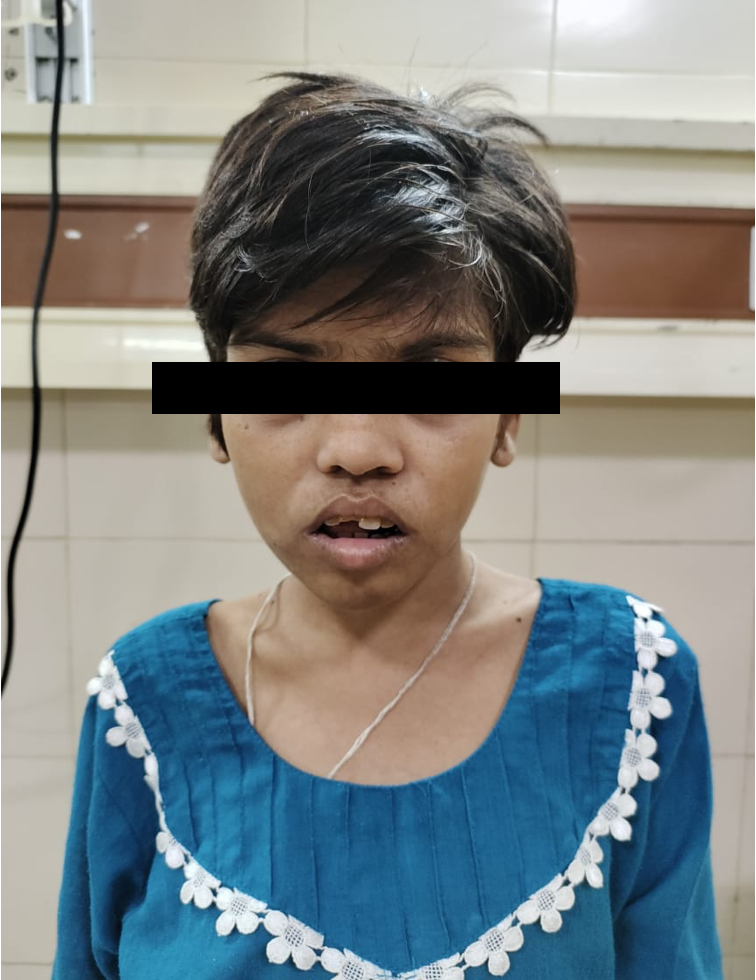Sunday Poster Session
Category: IBD
P1244 - Double Trouble: Managing Therapy-Refractory Crohn’s Disease in a Patient With Smith-Magenis Syndrome
Sunday, October 26, 2025
3:30 PM - 7:00 PM PDT
Location: Exhibit Hall

Saaketh Potharlanka (he/him/his)
All India Institute of Medical Sciences
New Delhi, Delhi, India
Presenting Author(s)
Saaketh Potharlanka, , Mridul Mahajan, MBBS, MD, DM, Himanshu Narang, MBBS, MD, DM, Rohit Garg, MBBS, MD, DM, R G Krishna Kumar, MBBS, MD, Ankur Goyal, MBBS, MD, Raju Sharma, MBBS, MD, Vineet Ahuja, MBBS, MD, DM
All India Institute of Medical Sciences, New Delhi, Delhi, India
Introduction: Pediatric-onset inflammatory bowel disease (IBD) is increasingly recognized to have an underlying genetic component, particularly in cases that are non-responsive to conventional therapies. We report a case of a 19-year-old female with early-onset, treatment-refractory Crohn’s disease (CD) with intellectual disability and growth failure. Genetic analysis revealed a heterozygous chromosomal deletion, raising the possibility of monogenic or genetically influenced IBD phenotype.
Case Description/
Methods: A 19-year-old female, born to non-consanguineous parents, at term, had facial dysmorphism, intellectual disability and short stature, which was not evaluated during childhood. She presented with chronic bloody diarrhea, tenesmus and fatigue since the age of 10. Colonoscopy revealed linear, deep ulcers and a stricture in the rectosigmoid region. Biopsies revealed features of chronic active colitis. CT enterography showed pancolitis with loss of haustrations, ileocecal junction thickening, and mesenteric fat stranding. A diagnosis of Crohn’s colitis was made, and patient initiated on oral corticosteroids followed by advanced therapy (Infliximab). Simultaneously, genetic testing with whole exome sequencing was done, which revealed a heterozygous missense variant in SLC39A4, and heterozygous deletion on chromosome 17 encompassing multiple genes.
The patient subsequently had secondary loss of response to Infliximab and in August 2024, she was re-admitted with similar complaints and repeat sigmoidoscopy showed persistent ulcerations and narrowing in the rectosigmoid region. She was started on Adalimumab, however, she has had only partial resolution in symptoms with persistent anemia and hypoalbuminemia. She is now being planned for combined advanced therapy with addition of Ustekinumab.
Discussion: This case illustrates diagnostic and therapeutic complexities in managing pediatric-onset Crohn’s disease, especially when associated with systemic clinical findings. The deletion on chromosome 17 leads to loss of genes including RAI1, SREBF1, TNFRSF13B. RAI1 deletion, which is causative of Smith-Magenis syndrome, is associated with intellectual disability, including speech and motor delay, craniofacial and skeletal anomalies and sleep disturbance. However, we could not find any case report linking IBD with Smith-Magenis syndrome. This case underscores the need for an evolving understanding of monogenic and genetically influenced IBD, which may pave the way for more targeted interventions in these patients.

Figure: Facial dysmorphism in our patient with Smith-Magenis Syndrome.

Figure: Axial (A), coronal (B), sagittal (C) and coronal maximum-intensity projection (MIP) (D)
images of the CT enterography of the patient show circumferential stratified mural thickening and
enhancement involving a long segment of the transverse colon with increased vascularity and
surrounding fat proliferation and dilation of the hepatic flexure suggestive of an inflammatory
stricture.
Disclosures:
Saaketh Potharlanka indicated no relevant financial relationships.
Mridul Mahajan indicated no relevant financial relationships.
Himanshu Narang indicated no relevant financial relationships.
Rohit Garg indicated no relevant financial relationships.
R G Krishna Kumar indicated no relevant financial relationships.
Ankur Goyal indicated no relevant financial relationships.
Raju Sharma indicated no relevant financial relationships.
Vineet Ahuja indicated no relevant financial relationships.
Saaketh Potharlanka, , Mridul Mahajan, MBBS, MD, DM, Himanshu Narang, MBBS, MD, DM, Rohit Garg, MBBS, MD, DM, R G Krishna Kumar, MBBS, MD, Ankur Goyal, MBBS, MD, Raju Sharma, MBBS, MD, Vineet Ahuja, MBBS, MD, DM. P1244 - Double Trouble: Managing Therapy-Refractory Crohn’s Disease in a Patient With Smith-Magenis Syndrome, ACG 2025 Annual Scientific Meeting Abstracts. Phoenix, AZ: American College of Gastroenterology.
All India Institute of Medical Sciences, New Delhi, Delhi, India
Introduction: Pediatric-onset inflammatory bowel disease (IBD) is increasingly recognized to have an underlying genetic component, particularly in cases that are non-responsive to conventional therapies. We report a case of a 19-year-old female with early-onset, treatment-refractory Crohn’s disease (CD) with intellectual disability and growth failure. Genetic analysis revealed a heterozygous chromosomal deletion, raising the possibility of monogenic or genetically influenced IBD phenotype.
Case Description/
Methods: A 19-year-old female, born to non-consanguineous parents, at term, had facial dysmorphism, intellectual disability and short stature, which was not evaluated during childhood. She presented with chronic bloody diarrhea, tenesmus and fatigue since the age of 10. Colonoscopy revealed linear, deep ulcers and a stricture in the rectosigmoid region. Biopsies revealed features of chronic active colitis. CT enterography showed pancolitis with loss of haustrations, ileocecal junction thickening, and mesenteric fat stranding. A diagnosis of Crohn’s colitis was made, and patient initiated on oral corticosteroids followed by advanced therapy (Infliximab). Simultaneously, genetic testing with whole exome sequencing was done, which revealed a heterozygous missense variant in SLC39A4, and heterozygous deletion on chromosome 17 encompassing multiple genes.
The patient subsequently had secondary loss of response to Infliximab and in August 2024, she was re-admitted with similar complaints and repeat sigmoidoscopy showed persistent ulcerations and narrowing in the rectosigmoid region. She was started on Adalimumab, however, she has had only partial resolution in symptoms with persistent anemia and hypoalbuminemia. She is now being planned for combined advanced therapy with addition of Ustekinumab.
Discussion: This case illustrates diagnostic and therapeutic complexities in managing pediatric-onset Crohn’s disease, especially when associated with systemic clinical findings. The deletion on chromosome 17 leads to loss of genes including RAI1, SREBF1, TNFRSF13B. RAI1 deletion, which is causative of Smith-Magenis syndrome, is associated with intellectual disability, including speech and motor delay, craniofacial and skeletal anomalies and sleep disturbance. However, we could not find any case report linking IBD with Smith-Magenis syndrome. This case underscores the need for an evolving understanding of monogenic and genetically influenced IBD, which may pave the way for more targeted interventions in these patients.

Figure: Facial dysmorphism in our patient with Smith-Magenis Syndrome.

Figure: Axial (A), coronal (B), sagittal (C) and coronal maximum-intensity projection (MIP) (D)
images of the CT enterography of the patient show circumferential stratified mural thickening and
enhancement involving a long segment of the transverse colon with increased vascularity and
surrounding fat proliferation and dilation of the hepatic flexure suggestive of an inflammatory
stricture.
Disclosures:
Saaketh Potharlanka indicated no relevant financial relationships.
Mridul Mahajan indicated no relevant financial relationships.
Himanshu Narang indicated no relevant financial relationships.
Rohit Garg indicated no relevant financial relationships.
R G Krishna Kumar indicated no relevant financial relationships.
Ankur Goyal indicated no relevant financial relationships.
Raju Sharma indicated no relevant financial relationships.
Vineet Ahuja indicated no relevant financial relationships.
Saaketh Potharlanka, , Mridul Mahajan, MBBS, MD, DM, Himanshu Narang, MBBS, MD, DM, Rohit Garg, MBBS, MD, DM, R G Krishna Kumar, MBBS, MD, Ankur Goyal, MBBS, MD, Raju Sharma, MBBS, MD, Vineet Ahuja, MBBS, MD, DM. P1244 - Double Trouble: Managing Therapy-Refractory Crohn’s Disease in a Patient With Smith-Magenis Syndrome, ACG 2025 Annual Scientific Meeting Abstracts. Phoenix, AZ: American College of Gastroenterology.
